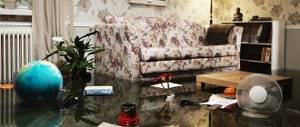Each of us may encounter a situation where, due to a burst pipe or breakdown of household appliances, the neighbors below are flooded with a stream of water. What to do in this case?
Many insurance companies offer apartment insurance against flooding of neighbors. In this case, all you have to do is contact the company’s representatives, and they will solve the problem.
But what to do if your neighbors below are flooded through no fault of your own? How to prove your innocence yourself? The main thing is not to panic and act in an organized manner.
General mobilization
Act with a cool head - quickly and calmly. We tell you point by point what to do.
- First, if you are at work or visiting, estimate how long it will take to be home
.
If it takes a very long time, think that perhaps one of your relatives will be able to get to the apartment faster. In any case, call the affected neighbors back and tell them what time you or someone you know will appear at home. Does it turn out bad in any case? Arrange with them to call a plumber from the emergency dispatch service. After all, if the problem is serious and there is a lot of flooding, you urgently need to shut off the riser.
- If your apartment is insured while you are driving home, call the insurance company
and describe the situation.
- When you arrive home, turn off the electricity (on the panel) and turn off the valves on the hot and cold water risers in the apartment
. Then immediately call the management company (MC) and the emergency dispatch service, if the neighbors have not already done so.
Is your home connected to the free social network Together? Then you can quickly contact your management company and neighbors online, even if you don’t have their phone numbers. Text the victims that you are on your way and call a plumber at home.
- Collect water from your floor
. Call for help from everyone who is nearby - family, friends. The faster you eliminate puddles, the less liquid will have time to flow down.
- When you're finished, go down to the victims. Offer help
if needed.
Maybe you need to move something heavy or wipe off moisture from furniture. With a small leak, only the ceiling has time to get wet; with a large leak, the walls, furniture, and floor also get wet. But your participation will in any case bring benefits: it will endear you to your neighbors. By the way, the opposite happens: neighbors can offer their help to eliminate the flooding as quickly as possible. If you come across such kind people, rejoice, agree and thank them.
- While you are visiting flooded victims, evaluate the actual damage caused to the apartment and things . Ask to take photographs of the condition of the home.
This will be useful for confirmation if the neighbor decides to sue. This way you will protect yourself from falsifying facts and paying for non-existent damage.
- Meet the plumber and representatives from the management company and service organization. Together with them, inspect the location of the leak
.
- When the commission goes to the injured party, go down with them and supervise the preparation of the flooding report
.
This is important if your neighbor is cunning and confrontational. By being present when the act is drawn up, you will not allow anything that was not damaged to be included in the damage caused.
- If the established cause of the flood confirms your guilt, agree on the amount of compensation with your neighbor
.
Try to come to an agreement on a humane basis. Explain that this is only what it seems: now I’ll go to court and get the money back! But in fact, it’s a long and tedious task that requires time, money and effort. And from both the culprit and the victim.
Calculate how much repairs will cost and how much money will be needed to fix broken equipment. If you can reach a compromise, draw up an agreement on the amount of damage, and sign a receipt directly when transferring the money.
Keep in mind that the agreement is not a guarantee that the neighbor will not conduct an independent examination and ask for a different amount. He is entitled to full compensation for damages.
- If you can’t reach an amicable agreement, ask that information about any disagreements that have arisen be included in the document
.
In this case we are talking about a list of damages. The neighbor may insist on his version, but you, seeing that he wants to further update the repairs at your expense, have the right to disagree.
We will tell you below how to determine the amount of payment for the damage caused. In the meantime, let's return to the question of the guilty.
A heating pipe burst, flooding the neighbors. Who is guilty?
If the flooding occurred due to a broken heating pipe, then the management company is responsible.
- Since flooding can occur for various reasons, the owner of the property located above the flooded apartment is not always to blame. Who should be held responsible in a case where it was definitely established that the “flood” occurred due to a burst heating pipe?
- If you live in an apartment under a social or private tenancy agreement, major repairs are the responsibility of the homeowner and responsibility for a pipe break lies with him. The only exception is when the lease agreement provides for other conditions.
- In other cases, responsibility for flooding lies with management organizations whose responsibilities include maintaining the house.
Whose fault?
It is not at all necessary that you caused the leak. The following may also be held responsible for what happened:
- Your neighbors
are upstairs or to the side.
This is when you yourself have become a victim of flooding and water has leaked through your apartment to the lower floors.
- A service organization hired by your management company, or the management company itself
(depending on the specific terms of the agreement concluded between them)
This is if an old rusty communal pipe burst and was not replaced in time.
It is necessary to distinguish between the pipeline system inside the apartment and the one that applies to the entire house. If something happened to the general system - it exploded in the sewer or central heating - you have nothing to do with it. Compensation can be demanded from all of these persons. To do this, you need to assess the amount of damage and the amount of compensation. The same must be done when you are at fault, but it was not possible to agree on compensation with your neighbor.
How is damage from the flood assessed (how much should I pay)?
The question of how much you will have to pay in this situation and how to assess the damage, as a rule, worries everyone just as much as the problem of finding the culprit in the incident. There are several ways to assess and compensate for losses due to a residential flood:
- Together with the victims, determine the approximate cost of the damage caused based on market prices and, by mutual agreement, pay the agreed amount. It is important to say that in case of flooding it is necessary to draw up an act in which it is required to reflect the amount of damage or the method of determining the cost; and after the amount has been agreed upon, make an annex to the deed, indicating that the two parties (you and the injured neighbor) agreed to estimate the cost at a certain amount. Further (either according to the text of the same application) either indicate that the above-mentioned amount has been paid and the parties have no claims against each other, or require a receipt from the victim that he received the specified amount as compensation.
- Determine, together with the victim, the amount of materials needed to restore the damaged property, clarify its list and purchase similar materials (property) independently in stores. Damage may also include the cost of work (for example, finishing). In this case, your task will be to calculate not the price of goods, but their quantity, range and scope of work.
Independent assessment
To determine the damages caused and calculate the amount of compensation, you need to invite an independent expert. You can find the nearest inspection companies on the Internet. Just make sure that the company you choose has a professional liability insurance policy. And also that it be a member of a self-regulatory organization of appraisers.
The expert's services will be paid for by the one who is most interested in them. And if you agree, you can split the costs in half.
The expert will record the condition of the flooded apartment: take photographs and take measurements. And he will give you a conclusion-report, which will indicate the amount of damage and its compensation.
How much water does it take to flood your neighbors?
10-15 liters of water is enough to make your neighbors’ ceiling drip.
It is impossible to give an exact answer to the question of how much water is needed to flood the neighbors. This depends on the condition of the living space.
If the house has poor waterproofing, 10–15 liters of liquid is enough for the neighbors to start dripping from the ceiling.
If the apartment below has high-quality suspended ceilings, much more water will be required, since the dense material will inhibit the penetration of liquid.
Judicially
Well, what if nothing convinced your neighbor and he still decided to sue you? We'll have to participate in this.
There is hardly any need to worry too much. The court will rely only on evidence: photos and videos taken by an independent expert. This means that it will no longer be possible to invent something beyond measure.
It must be taken into account that if the plaintiff orders the assessment, he may abuse his right and show the appraiser more damage than actually occurred. Therefore, be sure to be present during the inspection.
Change the taps on time, do not forget to turn off the water, and may the dry floor and happy neighbors below be with you!
How to prove your case in court?
Let's go to court. Photo No. 2
If the Criminal Code stubbornly refuses to admit its guilt and compensate for the damage caused by the flooding, then it will have to go to court. In order to defend your rights, you need to be well prepared for the process. To do this, you must correctly draw up the application itself and collect the necessary evidence and documents. A report on the causes of the accident should be provided.
If the Criminal Code did not provide you with a copy of it, then you can provide your evidence of the accident. Photos taken after the flood, testimonies of neighbors, and the results of an independent examination may be suitable. When considering such cases, the court needs to establish several important points:
- the very fact of flooding;
- the reason for the flood;
- person responsible for compensation of damage;
- the amount of damage caused.
All these facts and circumstances will need to be proven when considering the dispute. The fact and causes of the accident must be specified in the act of the Criminal Code. Providing documents compiled by independent experts is also not prohibited.
Based on the cause of the flood, the person responsible for the damage is determined. As for its size, it is better to have a professional assessment of the damage. An approximate amount indicated without providing appropriate confirmation will raise great doubts among the court and the other party.
If the culprit of the accident is the housing office
How not to pay? Establishing the true cause of the flooding is a decisive factor in determining the culprit, so do not skimp on the services of an expert, especially since if you manage to prove the guilt of the housing office, the latter is obliged to cover the costs not only caused by the flooding, but also those incurred by you when paying for the work carried out examination.
Simply put, if you prove the guilt of the housing office employees, they are obliged to compensate for all your expenses incurred in the process of proving your innocence. Perhaps there will be no need to involve an independent expert, since housing office specialists, after establishing the cause of the flooding, will agree to compensate for the damage voluntarily. However, you shouldn’t count on this too much.
In any case, after eliminating the cause of the accident, representatives of the management organization are required to draw up a flood report indicating the causes of the incident. Your task is to require the document to be drawn up in two copies, one of which you will take for yourself.
Through the court
The last step would be to go to court. A claim for compensation for damage after flooding of an apartment is usually filed if it was not possible to reach a peaceful agreement or the parties did not agree on the amount of compensation.
What should you keep in mind when preparing for a court hearing?
- Thoroughly collect all the evidence confirming your case (examination results, photos of faults, complaints to the housing office regarding the elimination of breakdowns that were left unattended, etc.).
- The state fee is paid by the person filing the claim. Its size is calculated based on the amount of compensation claimed, but reimbursement of the cost of paying the fee will fall on the loser. It also pays attorney fees for both the plaintiff and the defendant.
- If the defendant is not satisfied with the examination presented by the plaintiff, he has the right to challenge its results and petition to postpone the hearing until he conducts a re-examination.
- The victim has the right to demand not only basic compensation, but also payment for lost profits if, for example, the apartment had to be sold cheaper due to a flood or things that the owner used to earn money were damaged. The claim may also include compensation for moral damages.
On a note! The plaintiff must document each type of compensation. The defendant retains the right to challenge the claims by presenting counterarguments.
If it turns out that you flooded your neighbors below, do not panic, because now you know what to do and where to go.
Answers to the most frequently asked questions
Where to go when flooded?
The first step is to eliminate the causes of the leak and record the fact of what happened. To do this, you need to call your service company.
The arriving master must conduct an inspection and draw up a report. This point needs to be monitored, because without documentary evidence of the flooding and its causes, it will be difficult to prove one’s innocence in what happened.
Is a damage assessment necessary?
If, after a flood, disputes arise with neighbors or the management company, then it is better to make an assessment of the damage. This will help to avoid the other party underestimating or overstating the extent of damages.
What to do if the neighbors above are constantly flooding
Neighbors, like relatives, alas, are not chosen. At the same time, often those who live behind the wall or in the apartment above can turn our life into a living hell. This happened to Mogilev resident Natalya Lemkova, who lives in house No. 44 on Movchansky Street in apartment No. 8.
A family of four lives above it - an elderly couple with two adult sons. For many years they have regularly flooded Natalia's apartment. The next flood happened in November last year, the next time it flowed from the ceiling in January, and again in March. Every time you have to do the repairs again - putty, repaint, whitewash the walls and ceilings, re-glue the wallpaper, and even wash and clean things from construction dust. And this is not only an extremely unpleasant additional hassle, but also a lot of money: for example, during the February repairs, the owner of a flooded apartment used up and paid for two monthly norms of water for washing and scrubbing damaged property.
Natalya claims that she tried many times to talk to her neighbors in an amicable way, but every time she heard the same thing: “Leave me alone, I’m sick of you, everything is fine with us!”
Usually in such situations, lawyers advise insuring real estate - they say it is convenient and reliable, and there is no need to go to court every time for damages. However, Natalia’s apartment has been insured for several years. After another flood, the housing department foreman and a representative of the insurance company always come to her to draw up reports. But, firstly, a lot of time usually passes from paperwork to receiving money. And, secondly, not all expenses are reimbursed by the insurance company. Natalya lists only some cost items that are not taken into account by anyone:
— Increased energy consumption due to the use of power tools by builders, damage to kitchen cabinets and interior doors, which swelled due to dampness and began to close poorly. The chipboard floors now squeak. But for some reason no one connects all these troubles with constant “waterfalls”.
photo: reference.com And also constant dampness in the apartment, developing fungus and mold! In addition, Natalya has to take days off from work at her own expense to wait for the visit of various commissions and representatives - a loss in income.
Moreover, the last time she received from the insurance company only 43 rubles for repairs - the amount, of course, is ridiculous.
Having heard all this, the first thing I did, of course, was to personally communicate with those who flood Mogilevka. Natalya herself volunteered to accompany me to her offenders. But, oddly enough, there was no bell in the apartment of her upstairs neighbors. No matter how much we tried to reach out and shout out, they didn’t open to us. The situation repeated itself the next day. At the help desk they told me that there is no landline telephone at this address, and it is not possible to find out the numbers of mobile phones, if any in this family. In general, the conversation did not work out for reasons beyond my control.
But housing department master Ekaterina Gennadievna
, who is well aware of the situation, told me a lot of interesting things. The “water” family is dysfunctional. Its head visited places not so remote, the sons also followed a crooked path - they drink and make scandals. Utility workers try to go to a bad apartment only when accompanied by a local police inspector.
Those who flooded have already been fined for the unsatisfactory condition of the engineering equipment, due to which water flooded the neighbor below. Moreover, housing department employees personally replaced the failed parts, for which the problem family still has not paid them back.
By the way, the disadvantaged residents of a three-room apartment have accumulated a considerable debt for utilities. Recently they were even warned in writing that they were on the waiting list for eviction, but, apparently, this gloomy prospect did not frighten them much. In any case, they did not repay the debt and did not behave more decently.
It is not surprising that Natalya Lemkova considers the situation she finds herself in to be almost hopeless. Constant flooding and repairs, a waste of money, effort, and nerves. She repeatedly tried to sell her apartment in order to buy a new one, although she has lived here for a long time and is used to it. However, potential buyers, as soon as they learn about problematic neighbors, immediately evaporate.
Driven to despair, a Mogilev resident recently turned to the city authorities by sending an email to the official website. She insists that the “hydro-tenants” be evicted from the apartment. In addition, in addition to constant “waterfalls,” they created unsanitary conditions. They argue, they make noise, they play music loudly at night. Everyone who suffers from getting into a bad apartment either screams for a long time under the windows, or hammers on the door so that there is a roar throughout the entire entrance.
Natalya is also supported by other residents of house No. 44 on Movchansky Street: indeed, it is high time for the troublemakers to be called to order. But how to do that? Someone says: they need to evict, period. And someone considers such a harsh measure to be excessive: people, no matter what they are, should not become homeless. After all, a problematic family that poisons the lives of many has been living in their three-room apartment for decades.
However, Mogilev lawyer Maxim Vorobyov believes that city authorities, even if they want, do not have the right to evict citizens from their apartments without a court decision. Moreover, in this case, the lawsuit should be filed in court not by a private person, for example, Natalya herself, no matter how much she suffered from the actions of her neighbors, but by the utility company “Center for Urban Information Systems.” It is the TsGIS in Mogilev that is engaged in the calculation, accrual, acceptance and accounting of payments from the population for housing and communal services, which means that the dysfunctional family owes a large amount to this enterprise.
Meanwhile, the senior district inspector of the law enforcement and prevention department of the Leninsky District Department of Internal Affairs of Mogilev, police major Pavel Basharimov, reminds that it is dysfunctional families who most often flood their neighbors, since they do not monitor the serviceability of communications in their apartments and often forget to turn off the taps. It is also their fault that in most cases fires occur in apartment buildings and the private sector due to carelessness when smoking and malfunctioning stoves. They are also in first place in terms of the number of exploding gas cylinders. So there is reason to think about how to protect others from such unfortunate neighbors.
COMPETENTLY
Vasily Cherny, Chairman of the Mogilev City Consumer Protection Organization:
-
According to the law, if the amount of damages paid by the insurance company does not cover all repair costs, you can file a claim and send it to the perpetrators with a requirement to pay the difference between the actual costs and the amount received.
If the addressee does not respond, file a lawsuit. But, of course, it would be better if insurance companies reconsidered the methodology for calculating compensation for losses and paid the person who was flooded enough to cover all expenses. At the same time, I am against evicting a problem family onto the street. It’s better to find them a smaller apartment on the ground floor so that no one is flooded. Elena Isakova, senior assistant prosecutor of Mogilev:
“
I wouldn’t show loyalty to such asocial people; it wouldn’t lead to anything good.”
I think eviction is a completely fair measure. If, due to a person’s fault, a flood or fire once occurred and he realized his guilt, drew conclusions, compensated for the damage and became more careful, he can be understood. But if someone poisons the lives of their neighbors day after day, society should be intolerant of such families. Moreover, living next to dysfunctional families can be truly dangerous, and usually there is nothing to take from them as compensation for damage. [email protected]
Who pays for the damage when neighbors flood below?
- two reports on the spill (the first - drawn up by the emergency team, the second - drawn up by a commission, which should include representatives of the management company or the HOA (housing cooperative). If the accident was eliminated independently and the emergency team was not called, one report is drawn up);
A neighbor's spill is always an emergency, both for the victims and for the perpetrators. If an accident occurs in your apartment, for example, a battery burst or a water tap broke, and your neighbors were injured, do not panic, but act logically and consistently. If you do everything correctly, you will protect yourself from unnecessary costs and prevent your neighbors from abusing their rights. So, what to do if your neighbors below are flooded?
About the compensation process
Who will compensate for the damage and to what extent? The most important step in solving flooding problems for neighbors below is determining who should compensate for the damage and how. As noted earlier, there may be three culprits in this situation, and therefore there are also three possible courses of action. Let's look at each of them:
- Situation No. 1 – The homeowner is to blame . Everything here is extremely simple: the guilty and injured parties determine the order in which they will solve the problem that has arisen. If everything is fine in the relations between neighbors and the culprit agrees that he is “guilty,” the parties come to a common denominator and the problem is resolved through compensation for damage. The latter, by the way, must be documented, by drawing up a corresponding receipt on behalf of the victim stating that there are no claims on his part against the perpetrator. If a peaceful solution to the problem cannot be achieved, then the injured party, taking with them the flooding report, personal documents and other evidence of what happened, must go to court to file a statement of claim, on which legal proceedings will be initiated. In such a situation, everything depends on the final verdict of the court.
- Situation No. 2 – The tenant is to blame . In this case, the possible development of events is similar to that described above, only the employer plays the role of the guilty party instead of the owner of the apartment from which the flooding occurred.
- Situation No. 3 – The management company or other persons responsible for the maintenance of common property, the malfunction of which provoked the “flood,” are guilty. Here, the possibility of solving the problem can also take place both peacefully and in court. However, not only the flooded neighbors below have the right to claim compensation for damage, but also the owner of the home from which the flooding itself occurred. That is, the procedure is also similar to situation No. 1, but the injured party is more expanded and must act comprehensively.
In practice, similar cases in the Russian Federation in the same number of situations are resolved both peacefully and in court. It is only worth noting that if there is significant evidence that a particular person is guilty, there is no need for him to sue, since in addition to compensation for damage, he will be required to pay compensation for organizing legal arguments on the part of the plaintiff, and this, in turn, can cost a pretty penny.








